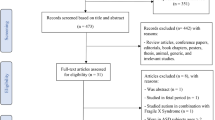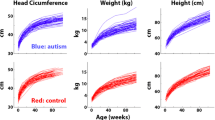Abstract
Pre/perinatal risk factors and body growth abnormalities have been studied frequently as early risk markers in autism spectrum disorder (ASD), yet their interrelatedness in ASD has received very little research attention. This is surprising, given that pre/perinatal risk factors can have a substantial impact on growth trajectories in the first years of life. We aimed to determine which pre/perinatal factors were more prevalent in ASD children and if these factors differentially influenced body growth in ASD and control children. A total of 96 ASD and 163 control children matched for gender participated. Data of growth of head size and body length during the first 13 months of life were collected. Data on pre/perinatal risk factors were retrospectively collected through standardized questionnaires. Results indicated that after matching for SES, prematurity/low birth weight and being first born were more prevalent in the ASD versus the control group. In addition, with increasing age children with ASD tended to have a proportionally smaller head circumference compared to their height. However, the effect of prematurity/low birth weight on head growth corrected for height was significantly different in ASD and control children: premature/low birth weight control children showed a disproportionate larger head circumference in relation to height during their first year of life, whereas this effect was absent in premature/low birth weight ASD children. This may suggest that the etiology of abnormal growth is potentially different in ASD and control children: where abnormal growth in control children is related to suboptimal conditions in the uterus, abnormal growth in ASD may be more strongly related to the causal factors that also increase the risk for ASD. However, prospective studies measuring growth and ASD characteristics in both premature/low birth weight and a terme children are necessary to support this conclusion.




Similar content being viewed by others
References
Autism and Developmental Disabilities Monitoring Network Surveillance Year 2008 Principal Investigators; Centers for Disease Control and Prevention (2008) Prevalence of autism spectrum disorders–autism and developmental disabilities monitoring network, 14 sites, United States, 2008. Morb Mortal Wkl Rep Surveill Summ 61:1–19
Levy SE, Mandell DS, Schultz RT (2009) Autism. Lancet 374:1627–1638
Gardener H, Spiegelman D, Buka SL (2009) Prenatal risk factors for autism: comprehensive meta-analysis. Br J Psychiatry 195:7–14
Kanner L (1943) Autistic disturbances of affective contact. Nerv Child 2:217–250
Bartholomeusz HH, Courchesne E, Karns CM (2002) Relationship between head circumference and brain volume in healthy normal toddlers, children, and adults. Neuropediatrics 33:239–241
Amaral DG, Schumann CM, Nordahl CW (2008) Neuroanatomy of autism. Trends Neurosci 31:137–145
Courchesne E, Campbell K, Solso S (2011) Brain growth across the life span in autism: age-specific changes in anatomical pathology. Brain Res 1380:138–145
Redcay E, Courchesne E (2005) When is the brain enlarged in autism? A meta-analysis of all brain size reports. Biol Psychiatry 58:1–9
van Daalen E, Swinkels SH, Dietz C, van Engeland H, Buitelaar JK (2007) Body length and head growth in the first year of life in autism. Pediatr Neurol 37:324–330
Dissanayake C, Bui QM, Huggins R, Loesch DZ (2006) Growth in stature and head circumference in high-functioning autism and Asperger disorder during the first 3 years of life. Dev Psychopathol 18:381–393
Fukumoto A, Hashimoto T, Mori K, Tsuda Y, Arisawa K, Kagami S (2011) Head circumference and body growth in autism spectrum disorders. Brain Develop 33:569–575
Mraz KD, Dixon J, Dumont-Mathieu T, Fein D (2009) Accelerated head and body growth in infants later diagnosed with autism spectrum disorders: a comparative study of optimal outcome children. J Child Neurol 24:833–845
Torrey EF, Dhavale D, Lawlor JP, Yolken RH (2004) Autism and head circumference in the first year of life. Biol Psychiatry 56:892–894
Newschaffer CJ, Cole SR (2005) Invited commentary: risk factors for autism—perinatal factors, parental psychiatric history, and socioeconomic status. Am J Epidemiol 161:926–928
Bolten MI, Wurmser H, Buske-Kirschbaum A, Papoušek M, Pirke KM, Hellhammer D (2011) Cortisol levels in pregnancy as a psychobiological predictor for birth weight. Arch Womens Ment Health 14:33–41
Bottomley C, Bourne T (2009) Dating and growth in the first trimester. Best Pract Res Clin Obstet Gynaecol 23:439–452
Regnault N, Botton J, Forhan A, Hankard R, Thiebaugeorges O, Hillier TA et al (2010) Determinants of early ponderal and statural growth in full-term infants in the EDEN mother-child cohort study. Am J Clin Nutr 92:594–602
Wikstrand MH, Hård AL, Niklasson A, Smith L, Löfqvist C, Hellström A (2011). Maternal and neonatal factors associated with poor early weight gain and later retinopathy of prematurity. Acta Paediatr (epub ahead of print)
Kanellopoulos TA, Varvarigou AA, Karatza AA, Beratis NG (2007) Course of growth during the first 6 years in children exposed in utero to tobacco smoke. Eur J Pediatr 166:685–692
Regnault N, Botton J, Heude B, Forhan A, Hankard R, Foliguet B. et al (2011) Higher cord C-peptide concentrations are associated with slower growth rate in the 1st year of life in girls but not in boys. Diabetes (epub ahead of print)
Sauer PJ (2007) Can extrauterine growth approximate intrauterine growth? Should it? Am J Clin Nutr 85:608S–613S
Rommelse NN, Peters CT, Oosterling IJ, Visser JC, Bons D, van Steijn DJ, Draaisma J, van der Gaag RJ, Buitelaar JK (2011) A pilot study of abnormal growth in autism spectrum disorders and other childhood psychiatric disorders. J Autism Dev Disord 41(1):44–54
Oosterling IJ, Wensing M, Swinkels SH, van der Gaag RJ, Visser JC, Woudenberg T et al (2010) Advancing early detection of autism spectrum disorder by applying a two-stage screening approach. J Child Psychol Psychiatry 51:250–258
Swinkels SH, Dietz C, van Daalen E, Kerkhof IH, van Engeland H, Buitelaar JK (2006) Screening for autistic spectrum in children aged 14 to 15 months. I: the development of the Early Screening of Autistic Traits Questionnaire (ESAT). J Autism Dev Disord 36:723–732
Zwaigenbaum L, Bryson S, Lord C, Rogers S (2009) Clinical assessment and management of toddlers with suspected autism spectrum disorder: insights from studies of high-risk infants. Pediatrics 123:1383–1391
Lord C, Rutter M, DiLavore P, Risi S (2001) Autism Diagnostic Observation Schedule (ADOS) manual. Western Psychological Services, Los Angeles, CA
Rutter M, Le Couteur A, Lord C (2003) ADI-R: autism diagnostic interview—revised. Western Psychological Services, Los Angeles, CA
Mullen E (1995) Mullen Scales of early learning, AGS edn. American Guidance Service, Circle Pines, MN
Schopler E, Reichler RJ, Bashford A, Lansing MD, Marcus LM (1990) The Psychoeducational Profile Revised (PEP-R). Austin: Pro-Ed
American Psychiatric Association (2000) Diagnostic and statistical manual of mental disorders, fourth Edition, Text Revision. American Psychiatric Association, Washington DC
Herrmann D, Suling M, Reisch L, Siani A, De Bourdeaudhuij I, Maes L et al (2011) Repeatability of maternal report on prenatal, perinatal and early postnatal factors: findings from the IDEFICS parental questionnaire. Int J Obes (Lond) 35:S52–S60
Troude P, L’Hélias LF, Raison-Boulley AM, Castel C, Pichon C, Bouyer J, de La Rochebrochard E (2008) Perinatal factors reported by mothers: do they agree with medical records? Eur J Epidemiol 23(8):557–564
Buka SL, Goldstein JM, Spartos E, Tsuang MT (2004) The retrospective measurement of prenatal and perinatal events: accuracy of maternal recall. Schizophr Res 71(2–3):417–426
Tate AR, Dezateux C, Cole TJ (2005) Millennium Cohort Study Child Health Group. Factors affecting a mother’s recall of her baby’s birth weight. Int J Epidemiol 34(3):688–695
Walton DL, Ludlow D, Willis DC (1993) Vaginal birth after cesarean section. Acceptance and outcome at a rural hospital. J Reprod Med 38(9):716–718
Rice F, Lewis A, Harold G, van den Bree M, Boivin J, Hay DF, Owen MJ, Thapar A (2007) Agreement between maternal report and antenatal records for a range of pre and peri-natal factors: the influence of maternal and child characteristics. Early Hum Dev. 83(8):497–504
Jacobson SW, Chiodo LM, Sokol RJ, Jacobson JL (2002) Validity of maternal report of prenatal alcohol, cocaine, and smoking in relation to neurobehavioral outcome. Pediatrics 109:815–825
Hannigan JH, Chiodo LM, Sokol RJ, Janisse J, Ager JW, Greenwald MK, Delaney-Black V (2010) A 14-year retrospective maternal report of alcohol consumption in pregnancy predicts pregnancy and teen outcomes. Alcohol 44:583–594
Fredriks AM, van Buuren S, Brugmeijer RJ, Meulmeester JF, Beuker RJ, Brugman E et al (2000) Continuing positive secular growth change in the Netherlands 1955–1997. Pediatr Res 38:411–418
Lainhart JE, Bigler ED, Bocian M, Coon H, Dinh E, Dawson G et al (2006) Head circumference and height in autism: a study by the collaborative program of excellence in autism. Am J Med Genet Part A 140A:2257–2274
R Development Core Team (2011) R: a language and environment for statistical computing. R Foundation for Statistical Computing, Vienna, Austria. ISBN 3-900051-07-0, URL http://www.R-project.org/
Pinheiro P, Bates D, DebRoy S, Sarkar D, R Development Core Team (2011). nlme: linear and nonlinear mixed effects models. R package version 3.1–101
Ergaz Z, Avgil M, Ornoy A (2005) Intrauterine growth restriction-etiology and consequences: what do we know about the human situation and experimental animal models? Reprod Toxicol 20:301–322
Johnson S, Hollis C, Hennessy E, Kochhar P, Wolke D, Marlow N (2011) Screening for autism in preterm children: diagnostic utility of the social communication questionnaire. Arch Dis Child 96:73–77
Conciatori M, Stodgell CJ, Hyman SL, O’Bara M, Militerni R, Bravaccio C et al (2004) Association between the HOXA1 A218G polymorphism and increased head circumference in patients with autism. Biol Psychiat 55:413–419
Luo R, Sanders SJ, Tian Y, Voineagu I, Huang N, Chu SH, et al (2012) Genome-wide transcriptome profiling reveals the functional impact of rare de novo and recurrent CNVs in autism spectrumdDisorders. Am J Human Genet (Epub ahead of print)
Dine MS, Gartside PS, Glueck CJ, Rheins L, Greene G, Khoury P (1981) Relationship of head circumference to length in the first 400 days of life: a mnemonic. Pediatrics 67:506–507
Takimoto H, Sugiyama T, Nozue M, Kusama K, Fukuoka H, Kato N, Yoshiike N (2011) Maternal antenatal body mass index gains as predictors of large-for-gestational-age infants and cesarean deliveries in Japanese singleton pregnancies. JObstet Gynaecol Res 37:553–562
Acknowledgments
We are grateful to all the children and parents who participated in this study.
Conflict of interest
None.
Author information
Authors and Affiliations
Corresponding author
Additional information
R. Donders and N. Rommelse shared final responsibility.
Rights and permissions
About this article
Cite this article
Schrieken, M., Visser, J., Oosterling, I. et al. Head circumference and height abnormalities in autism revisited: the role of pre- and perinatal risk factors. Eur Child Adolesc Psychiatry 22, 35–43 (2013). https://doi.org/10.1007/s00787-012-0318-1
Received:
Accepted:
Published:
Issue Date:
DOI: https://doi.org/10.1007/s00787-012-0318-1




